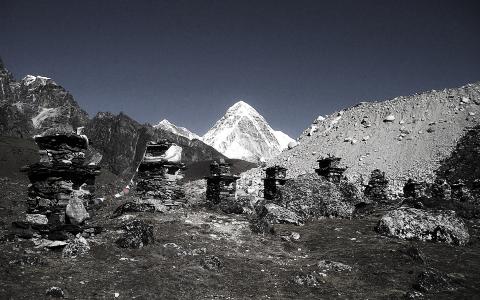
The Three Maxims of the Yoga of Action
If we consider the instruction of the Gītā as valuable in all places and at all times, the principles of karmayoga apply to all of us. Why? By karma here is meant not just scriptural and traditional rituals connected to devatās but also all life related activity. Whatever needs to be done to sustain the family – loans and receipts, searches for brides and grooms, squabbles with the in-laws, the good and bad...

The Vision of Equality (Sama-darśana)
This is a famous śloka. What does – sama-darśana - the vision of equality mean? Does equality imply that both the elephant and the cow be offered the same food? The word “equal” is one of the most misused words of our times. Politicians use this word ad nauseam. It is not uncommon for this word to be used without knowing its actual meaning or with an erroneous understanding. Equality is giving to each being...

The Actionless Ātmā
The whole of creation is thus created from Brahma’s power, Brahma’s līlā. It is enjoying ānanda (bliss) causing all these actions. Why do we call it ānanda? Ānanda is the nature of Brahma. Difficulty or pain is not in its nature. Even when we experience distress or sorrow, there is definitely an aspect of its līlā in them. To the divine, our laughter and tears are like the laughter and tears of children to adults....

The Steadfastness in Yoga of a Jñānī
yuktaḥ karmaphalaṃ tyaktvā śāntimāpnoti naiṣṭhikīm
ayuktaḥ kāmakāreṇa phale sakto nibadhyate (BG 5.12)
The word “yukta” here means yoked or harnessed to yoga or being steadfast in yoga. A jñānī, having performed action, gives up its fruit. We realise quite soon that it is not easy to do so. But it is not that rare either. When can a planter of a coconut palm see its fruit? The planter of the tree is...

The phrase hita-nirata (engaged in welfare) does not involve merely uttering homilies. It means those who internally resolve to act towards universal welfare and ensure that those resolutions are acted upon externally. It is thus not necessary for a saṃnyāsin to give up activity that yields in the well-being of the world. But such activities have to be performed with an extraordinary mindset. The activity referred to here is interacting with the...

Prologue to Chapter 5
ಬೋಧಿಸಿದೆ ಕರ್ಮಯೋಗವ
ಬೋಧಿಸಿದಿದಯ್ ಸಂನ್ಯಸನವನುಮನಾ ದ್ವಿಕದೊಳ್ ।
ಸಾಧನ ಮೇಲೆನಗಾವುದೊ
ಆದೇಶಿಪುದೆಂದು ಬೇಡಿದಂ ಕೌಂತೇಯಂ ।। ೧
Bodhisidĕ karma-yogava
bodhisiday saṃnyasana-vanumanā dvikadadoḷ
sādhana melĕnagāvudŏ
ādeśipudĕṃdu beḍidaṃ kauṃteyaṃ ।। 1
The son of Kunti implored,
“You taught me the Yoga of action.
You taught me renunciation.
Which of the two paths is better for me?
Please instruct me”
ಕರ್ಮವನೆಸಗಿಯುಮಾತ್ಮದ
ನಿರ್ಮಲತೆಯ ಕ...

APPENDIX 2
Distinction between karma and akarma
karmaṇo hy-api boddhavyam boddhavyam ca vikarmaṇaḥ
akarmaṇaś-ca boddhavyaṃ gahanā karmaṇo gatiḥ (BG 4.17)
The discussion on karma and akarma is so deep that it baffles even the wise, says Bhagavān. What does that imply? Simply that the responsibility of a man is great and that it should translate into sad-asad-viveka -- discernment between right and wrong, truth and falsehood. Thus it becomes...

When they ascend the throne, England’s Kings (or Queens) take an oath in front of their subjects that they will follow, preserve, and protect the traditional methods and rules of governance. In India, the President who is in place of the King, takes this oath while swearing in — “I will, to the best of my ability, preserve, protect and defend the Constitution and the law.” (Art. 60) Thus, even the highest official of the state is subject to the...

The Necessity of Firm Decision
Arjuna, if we analyse from the perspective of the supreme principle, it becomes clear that your doubts are baseless. Be firm about the ātmā. Do not entertain doubts in your mind.
ajñaścāśraddhadhānaśca saṃśayātmā vinaśyati
nāyaṃ loko’sti na paraṃ na sukhaṃ saṃśayātmanaḥ (BG 4.40)
(One who does not know, doesn’t have faith or is filled with doubts in his mind, perishes. A doubtful man can neither live in this...

A person who carries out his duties without considering it an offering, will not even gain the good in this world. Then, how can he obtain a good state in other worlds? Mokṣa is the best among the four cardinal aims of human life. Karma helps achieve dharma, artha and kāma (dharma, wealth, and enjoyment). Even so, karma is the necessary first step for mokṣa. Mokṣa is liberation from the burden of the universe. Since we do not know the true...
